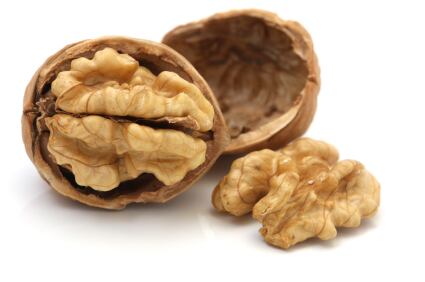Three things, speculated Dr Richard Mattes, Professor, Foods and Nutrition, at Purdue University, one of a series of academics to present about nuts at the 6th International Congress on Vegetarian Nutrition earlier this week.
Eat nuts as a morning snack and you’ll compensate later in the day for the calories consumed

First, nuts suppress hunger, as well as the desire to eat (which are not necessarily the same things - you can still desire a dessert even if you are full), he said. And as such, they “elicit strong dietary compensation that offsets two-thirds to three-quarters of the energy they yield”.
In other words, if you eat 100 calories-worth of nuts as a snack in the morning, you will probably compensate by reducing your calorie intake later on in the day by 66-75 calories, he said.
Whether this is because nuts absorb moisture in the GI tract and fill you up, or for other reasons, is not clear, he said, but the effects are not due to nuts’ impact on hormones affecting hunger such as CCK, PYY, ghrelin or GLP-1, he said.
Whatever the reason for the satiating effects, he said, “you will typically see spontaneous adjustments of up to three-quarters of energy consumed.”
We may have overestimated the calorie content of almonds by up to 20%
Second, recent research shows we don’t absorb all of the energy in almonds in particular, which means we may be overstating their calorie content by up to 20%, he added.
When you bite into an almond and break it up into smaller pieces, some of these pass through your digestive system intact, taking the energy contained in them with them, he explained. “If you analyze the feces [of people that have eaten almonds] you still see lipid-based energy in there.”
The rigid structure of the nut cell membranes appeared to lock in some fat, preventing it from being absorbed in the digestive tract, he said. (Research from USDA’s agricultural research services has also suggested that the same may apply to pistachios, which may deliver 5.9% fewer calories than previously thought.)
A lot depends on whether you grind up or slice the nuts, however, he said, with most or all of the fat in nut butters probably released as available energy, he said.
“If your main concern is body weight, eat whole nuts.”
Consuming nuts at breakfast helps prevent spikes in blood sugar throughout the morning and after lunch
Third, though the evidence is weaker, some research suggests chronic nut consumption is associated with an increase of resting metabolic rate, he said. “This could result in the loss of another 5-10% of the energy obtained from nuts.
“Combined, these three responses account for nearly all of the energy contained in a moderate portion.”
He added: “I’m not saying you can eat nuts with impunity, but it helps to explain why nut consumption doesn’t make us put on weight, which makes nuts very effective as snacks.”
As nuts are low GI (glycemic index) foods, which don’t raise blood glucose levels, they can also be used to mitigate the effects of high-carb products such as breakfast cereals and bakery products on blood sugar, he said.
Meanwhile, consuming nuts at breakfast appeared to help prevent spikes in blood sugar throughout the morning and after the next meal of the day, he said.
Few foods have experienced such a renaissance

If you asked most people where nuts belonged on a food pyramid 20 or 30 years ago, they would probably say in the sweets (ie. eat occasionally, or you’ll get fat) section, said Peter Pribis, associate professor of nutrition at Andrews University.
Today they are seen as nutritional dynamite, with beneficial effects on the heart and the brain, as well as helping people reduce their risk of diabetes and manage their weight, he said.
“Few foods have experienced such a renaissance.”
Give aged rats walnuts, he said, and they perform better in cognitive tests - although research to see if these effects can be replicated in humans is at a very preliminary stage.
Meanwhile, animal studies show walnuts also increase levels of Brain-Derived Neurotrophic Factor (BDNF), a protein believed to be important for learning, memory, alertness, mood, controlling body weight and energy metabolism; while low levels have been associated with obesity, diabetes, depression and Alzheimer's.
12 (slightly less) angry men
While a recent study conducted at Andrews University looking at the effects of giving walnuts (ground up and added to banana bread) to young people had not shown improvements in working memory, this may have been because the subjects (aged 18-25) were already at the peak of their cognitive abilities, he said.
Meanwhile, there were improvements in inference scores in the Watson Glaser tests, while male subjects also showed less hostility, he said.
Nuts and cardiovascular health

Other presenters at the conference highlighted a growing body of research into the effects of nuts on the heart, particularly walnuts, which have been shown to lower LDL cholesterol, decrease blood pressure and reduce inflammation (as measured by pro-inflammatory marker C-Reactive Protein).
Delegates also heard from investigators leading a large Spanish study showing that people following an energy unrestricted plant-based diet supplemented with extra-virgin olive oil or nuts reduced their risk of a major cardiovascular event by 30% compared with people following a purely low-fat diet.
The results of the Spanish PREDIMED trial - which began in 2003 and ended in 2011 - were so dramatic that it was ultimately stopped ahead of time for ethical reasons, as the control group was at such a disadvantage compared with the intervention groups.
The diet of people in the first intervention group was supplemented with 30g of nuts a day (15g walnuts, 7.5g almonds and 7.5g hazelnuts); while the diet of the second was supplemented with 50ml/day of extra virgin olive oil.
Co-investigator De Emilio Ros from the Hospital Clinic of Barcelona, said walnuts - the only nut to contain significant amounts of the omega-3 fatty acid ALA (alpha-linolenic acid) - may have contributed much of the benefit experienced by the volunteers in the first intervention group.
“In addition [to ALA]… walnuts offer numerous antioxidants and additional nutrients that I believe work together synergistically to produce their cardiovascular protective effect.”
